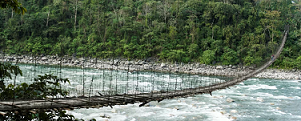/topics/rivers
Rivers
Compendium of sewage treatment technologies by Indian Institute of Technology, Kanpur
Posted on 24 Jan, 2013 04:14 PMThis compendium of sewage treatment technologies by the Indian Institute of Technology (IIT), Kanpur has been prepared, based on primary and secondary data gathered from operation of sewage treatment plants (STPs) in the country over the last two decades.
Udupi in Karnataka, sets standard for water management - Roundup of the week’s news (January 14 -20, 2013)
Posted on 21 Jan, 2013 03:20 PMUdupi in Karnataka, sets standard for water management
Neoliberalism and the nature of the Polavaram beast - How the project will affect the Koya settlements in the Eastern Ghats
Posted on 21 Jan, 2013 11:51 AMFascism of the beginning of the twenty first century is the articulation and translation of racism and ethnicity into politics. Political developments in the nineteen nineties and the first years of the twenty first century demonstrate the determination to control the peripheries and the 'third world'.
Water resources in India under changed climate scenario- A paper in International Journal of Engineering Research and Applications
Posted on 18 Jan, 2013 07:41 PMThe paper in its introduction states that the shortage for fresh water is becoming a limiting factor for the socio-economic development of many countries.
The forgotten and fading Mithi river of Mumbai: A comic strip depicting its state
Posted on 17 Jan, 2013 09:25 AMMoving from paddy and sugarcane to less water-intensive crops such as oilseeds, pulses and millets can help resolve the Cauvery water dispute
Posted on 14 Jan, 2013 12:10 AMWhat happens when two or more states are dependent on same water resource for agricultural purposes ? Do the states compete for the resource or are their needs sufficiently different from each other? What are the consequences of the competition for this precious resource?
This article sheds light on the dispute between Karnataka and Tamil Nadu, for sharing Cauvery river water. The ongoing tussle between the two states has seen a lot of unrest amongst farmers in form of dharnas, protests, rail roko and non-cooperation by citizens, and disagreement with the agreements made by their respective governments and unending negotiations by governments involved, to come to a mutually agreeable decision.
District-wise data on groundwater resources and its utilization in Andhra Pradesh for the year 2007-08 - A compilation by the Andhra Pradesh State Groundwater Department and the Central Groundwater Board
Posted on 13 Jan, 2013 10:53 PMThe data is categorised into watershed wise (basin-wise) annual availability of groundwater, current draft (utilisation), allocation for domestic and industrial needs, availability for future use (or the balance) and categorisation based on stage of development and rigorous statistical treatment of water levels.
Process of formation of Jajmau Area Water Partnership in Kanpur, Uttar Pradesh – Problems and solutions
Posted on 13 Jan, 2013 12:01 PMIndustrial effluents and sewage water are being diverted to the river Ganga by the cities and towns through which it passes. Nestled on the banks of Ganga, Kanpur, a highly urbanized and industrial city is polluting it most. Apart from the Government of India’s recently constituted National Ganga River Basin Authority, civil societies and NGOs too are putting rigorous efforts to make Ganga pollution free. Though the city has several big and small industries, the leather industries located in Jajmau, the oldest part of the city add to the problem of pollution in the river to a large extent.
Traditional diversion-based phad irrigation systems help mitigate risk of crop failure in the drought-prone farmer suicide belt of Vidarbha, Maharashtra
Posted on 11 Jan, 2013 11:56 AMMany of these systems (1) continue to function and are often more sustainable, cost-effective and successfully managed by local institutions. Phads are one such community-based and managed diversion irrigation management system (2) prevailing in the north-western part of Maharashtra and date back to the early 16th century as per historical accounts. The system is prevalent in the Tapi basin on rivers the Panjhra, Mosam and Aram in Dhule and Nashik districts (3).
Phads or diversion-based irrigation systems, are being revived and promoted in Vidarbha region of Maharashtra by Dilasa, a Yavatmal-based voluntary development organisation (Video courtesy: Dilasa)







